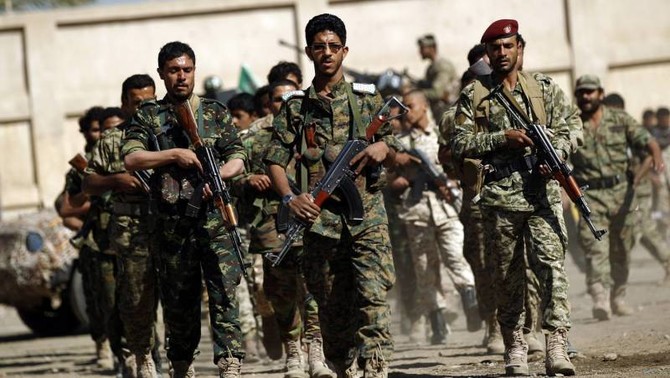LONDON: As joint forces of the Arab coalition rapidly moved closer to Hodeidah, fighting in areas six kilometers away from the city’s airport intensified on Wednesday, military sources said.
Yemen’s army said units from the “rapid intervention forces” were currently positioned in Al-Durayhmi and were ready to enter the strategic port city of Hodeidah from the south.
Yemeni army spokesman Abdo Abdullah Majali told Asharq Al-Awsat on Wednesday that the rapid intervention forces are trained to fight inside small neighborhoods and hunt down Houthi militias hiding in fortified buildings. He added that they would work to clear these buildings in preparation for the army’s entry into Hodeidah and its liberation while ensuring that residents remained safe.
Majali added that the liberation of Hodeidah would help the army to advance on several other Yemeni cities because of its strategic position as a port city and its proximity to Taiz, Ibb, Al-Mahwit, Dhamar, and Hajjah.
At least 53 rebels died in fighting in Hodeidah on Wednesday while seven pro-government fighters were killed and 14 wounded, according to medical sources.
A military source told Asharq Al-Awsat that the Houthi militias experienced heavy losses on fronts in the province of Saada as a result of confusion and panic.
The source added that these losses prevented the Houthis from sending military reinforcements to confront Arab coalition forces heading toward Hodeidah from the western coast.
In a phone call to Hodeidah’s governor on Wednesday, Yemen’s Prime Minister Ahmed bin Daghr praised the country’s army and the Popular Resistance for their competent role in combating Houthi militias which he said are losing strength every day.
Fighting rages near Yemen's Hodeidah airport
Fighting rages near Yemen's Hodeidah airport

- At least 53 rebels died in fighting in Hodeidah on Wednesday while seven pro-government fighters were killed and 14 wounded.
- Yemen’s Prime Minister Ahmed bin Daghr praised the country’s army and the Popular Resistance for their role in combating Houthi militias.
Iraq announces complete withdrawal of US-led coalition from federal territory

- The vast majority of coalition forces had withdrawn from Iraqi bases under a 2024 deal between Baghdad and Washington
- US and allied troops had been deployed to Iraq and Syria since 2014 to fight the Daesh group
BAGHDAD: Iraq said on Sunday US-led coalition forces had finished withdrawing from bases within the country’s federal territory, which excludes the autonomous northern Kurdistan region.
“We announce today... the completion of the evacuation of all military bases and leadership headquarters in the official federal areas of Iraq of advisers” of the US-led coalition, the military committee tasked with overseeing the end of the coalition’s mission said.
With the withdrawal, “these sites come under the full control of Iraqi security forces,” it said in the statement, adding that they would transition to “the stage of bilateral security relations with the United States.”
The vast majority of coalition forces had withdrawn from Iraqi bases under a 2024 deal between Baghdad and Washington outlining the end of the mission in Iraq by the end of 2025 and by September 2026 in the Kurdistan region.
US and allied troops had been deployed to Iraq and Syria since 2014 to fight the Daesh group, which had seized large swathes of both countries to declare their so-called “caliphate.”
The militant group, also known as “Islamic State,” was territorially defeated in Iraq in 2017 and in Syria in 2019, but continues to operate sleeper cells.
The vast majority of coalition troops withdrew from Iraq over previous stages, with only advisers remaining in the country.
The military committee on Sunday said Iraqi forces were now “fully capable of preventing the reappearance of IS in Iraq and its infiltration across borders.”
“Coordination with the international coalition will continue with regards to completely eliminating IS’s presence in Syria,” it added.
It pointed to “the coalition’s role in Iraq offering cross-border logistical support for operations in Syria, through their presence at an air base in Irbil,” the capital of Iraq’s Kurdistan region.
In December, two US soldiers and a civilian interpreter were killed in Syria in an attack blamed on IS, sparking fears of a resurgence in the country.
The statement added that anti-IS operations would be coordinated with the coalition through the Ain Assad base in Anbar province in western Iraq.
IS attacks in Iraq have massively declined in recent years, but the group maintains a presence in the country’s mountainous areas.
A UN Security Council report in August said: “In Iraq, the group has focused on rebuilding networks along the Syrian border and restoring capacity in the Badia region.”














